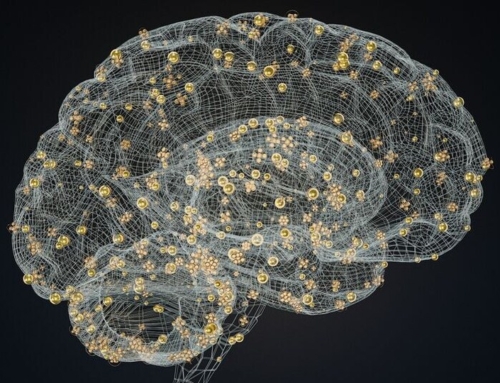Attention Deficit Disorder, known as ADD, is commonly recognized and present in children as an inability to remain focused in structured environments, such as school.
 Some of the more well-known symptoms of ADD that are easily identified include fleeting memory recall, very short attention span, and trouble with impulse control. These paint a picture of ADD, especially with children, as one of the more difficult and misdiagnosed conditions.
Some of the more well-known symptoms of ADD that are easily identified include fleeting memory recall, very short attention span, and trouble with impulse control. These paint a picture of ADD, especially with children, as one of the more difficult and misdiagnosed conditions.
However, often some of the more unusual symptoms of ADD are overlooked and misdiagnosed. Most school environments are not designed for free movement for those who are more hands-on learners. Often, restlessness and inattention can be mistaken for struggles with Attention Deficit Disorder.
Individuals with ADD often struggle with losing interest in topics that do not challenge them intellectually. This behavior often shows as inattention and is misinterpreted as “not paying attention.”
Among the symptoms of ADD, mood swings are another unusual sign. This is often mistaken for Bipolar Disorder and treated the same. However, mood swings are common with ADD.
When you’re able to see multiple perspectives and commit energy to these outcomes, often strong passions and emotions come with focusing on these desires. These strong emotional connections are very powerful and contribute to the creative energy that comes with ADD. When these feelings of deep connection and conviction are taken away, this can feel like you are not able to be your authentic self.
According to ADDitude (2019), a resource to view inside the ADD mind, some of the more unique factors with ADD help enrich the world of those with ADD. However, being able to learn to navigate these symptoms is essential to living with ADD.
Some areas that are essential to effective management begin with ensuring that restlessness does not become a hindrance. One of the feelings one may experience with ADD is a sense of boundless amounts of energy that interfere with adequate sleep.
Furthermore, sleep issues often impact school performance. Often when school performance becomes a concern, ADD is the most common diagnosis without consideration of learning disabilities or other factors. This can cause one to feel discouraged and reduce their desire to try harder in a school setting.
Some of the common medications used to treat ADD, such as stimulants like Adderall and Ritalin, can contribute further to the struggles in the school setting. This can be related to the difficulty with being able to sort through incoming sensory stimuli while also being asked to focus on topic for many hours.

Overlooked Symptoms of ADD
While many are aware of ADD and the overlooked and misdiagnosed symptoms, one may also experience secondary depression.
Secondary depression is not a contributor to ADD, but it can be caused by ADD due to the demands placed on one’s energy often when ADD is misdiagnosed or not properly managed with counseling and proper medication. Research indicates that depression has been shown to be present in adults with ADD approximately 47 percent of the time and 14 percent with children who have ADHD.
When struggling with ADD, it can feel like you are unable to accomplish any of the tasks you want. You see others who don’t have to battle with nearly as much difficulty. This is one reason why depression is often overlooked.
Coping with the symptoms of ADD and ADHD lead to feeling like you are unable to enjoy doing anything because of the challenges that come with having to stay focused.
 Having awareness of these unique and often overlooked challenges with ADD does not mean that you cannot enjoy activities. It means that your perspective of approaching these tasks is unique to you.
Having awareness of these unique and often overlooked challenges with ADD does not mean that you cannot enjoy activities. It means that your perspective of approaching these tasks is unique to you.
Often, individuals with ADD put forth more effort to calm their minds and be able to overcome challenges with tasks. These challenges lead to some of the unusual and overlooked symptoms of ADD.
Furthermore, experiencing challenges and being faced with situations where you feel defeated can bring up feelings of frustration. These feelings can be interpreted by others as being “defiant.” However, these feelings are usually expressed to mask anxiety due to the demands from the “non-ADDers.”
Anxiety and ADD also come hand in hand. Feelings of being overwhelmed and the effort needed to manage ADD contribute to anxiety. The antidote for anxiety related to ADD comes with accepting the challenges and being able to appreciate the effort applied to overcome and succeed. One of the overlooked and misdiagnosed symptoms of ADD is connected to this concept. This factor often presents as feeling “on edge” and a sense of not having control.
When you focus on tasks, it can feel like wading through a cloud. Often with ADD, the ability to remain focused can be a significant challenge and daydreaming can have a role in becoming preoccupied with thoughts as they come. This can often lead to feelings of frustration because of the struggle with filtering out distractions. However, being able to exercise grace towards oneself when faced with distracting thoughts is important to acknowledging this as a part of living with ADD.
 Furthermore, some of the overlooked and misdiagnosed symptoms of ADD begin with the negative view of ADD in individuals. Some of the common symptoms also are directly linked with a unique perspective of the world. This perspective brings many unusual benefits related to having a creative mind. Without these traits, many individuals who have been known to have ADD would not be successful in their roles.
Furthermore, some of the overlooked and misdiagnosed symptoms of ADD begin with the negative view of ADD in individuals. Some of the common symptoms also are directly linked with a unique perspective of the world. This perspective brings many unusual benefits related to having a creative mind. Without these traits, many individuals who have been known to have ADD would not be successful in their roles.
Not only have individuals been successful with ADD, the Bible also references 15 different verses about how God sees creativity as His handiwork. Ephesians 2:10 says, “For we are God’s handiwork, created in Christ Jesus to do good works, which God prepared in advance for us to do.”
So, we can rest in knowing that God has called us and fashioned us as His own. While others may say that ADD is a condition that must be cured, being able to work and live with ADD begins with being able to understand its role and how to effectively use its unusual benefits.
ADD Symptoms and Unusual Benefits of ADD
Some of the most unusual, misdiagnosed, and misunderstood symptoms of ADD that have been mentioned is the “otherness” of viewing the world through the lens that ADD affords. These benefits begin with understanding how the mind processes information for individuals with ADD. It’s important to recognize this information to help overcome the feelings that you’d be better off if you were a different person.
Although it may seem a little odd to consider that there are benefits of living with ADD, being able to embrace those traits which make us unique is essential. The process of being able to accept the changes that come with ADD helps free one to explore how these symptoms can be integrated into their lives.
RELATED ARTICLE: The Secret Superpowers of the Adult ADD Brain
You may have days where you feel it’s not worth the effort. However, per Eby (2019), the creative mind is one overlooked and unusual benefit of ADD. Some of the most well-known visionaries in entertainment, such as Walt Disney, was diagnosed with ADD. It’s important to identify those battles with ADD that are worth fighting. Each experience brings new clarity and insight into oneself as well as learning more about the world.
In my experience, ADD gives a different brush to paint the world. Each work of art is not discredited because it is different from another. Instead, it’s praised for the individuality. This metaphor is a great example of what life is like with ADD. It may be more scattered, and at times feel overwhelming, but it’s no less beautiful.
Creativity and ADD
Life is about embracing those moments in which we are most passionate. Without the spark to hold one’s interests, little can be accomplished. Some of the most overlooked, misdiagnosed, and unusual symptoms of ADD focus on limiting one’s interests to activities and areas which wholly grab their attention.
 It can be easy to become distracted with all the different information being processed daily. Being easily distracted and aware of these distractions is an awareness of realizing only those subjects that are truly of importance.
It can be easy to become distracted with all the different information being processed daily. Being easily distracted and aware of these distractions is an awareness of realizing only those subjects that are truly of importance.
The creative mind and ADD are companions to each other. One helps to sort through those moments in life that are truly valuable and worthy of the time spent. The other begins to provide the sense of connecting to others who share these interests. Individuals with ADD are attuned to recognize and give attention to multiple factors at a time. This is a unique strength of ADD.
The ability to filter through information and observe multiple options at once provides a unique advantage to individuals with ADD. It has been shown that test scores linked to creative thinking, divergent thinking (thoughts which are not accepted without fact), and creative achievement are much greater. One may notice that activities which involve imagination, such as daydreaming, are much more prominent when living with ADD.
Support has shown that the minds of highly creative people and those who also show the same traits for ADD are closely similar. Often, individuals with ADD are considered eccentric and unusual by the terms of “normal” individuals. One community where one can often find their place is among the art community.
Being allowed to embrace one’s whole self allows for honesty and connection. The unique traits which have been discussed with ADD show a strong link with being able to embrace creativity. ADD brings with it many misdiagnosed and often overlooked symptoms which encompass the best parts of an individual. These parts help bring a unique approach to life and all it offers.
Now, it’s important to be able to meet with a trained mental health professional to determine and diagnose ADD. It’s also crucial you find someone with whom you feel validated and can connect. Often, being told you have ADD can name the feelings you have and help you recognize that it’s going to be okay.
It’s important to connect with someone like myself that gets it. I enjoy helping you find the best way to address and integrate ADD into your life. You are not alone. The first step is to be courageous and get connected today.
References:
Attitude. (2019). The ADHD Symptoms We Misdiagnose. Retrieved from https://www.additudemag.com/slideshows/adhd-misdiagnosis/
Eby, D. (2019). ADHD and The Creative Mind. Retrieved from http://thecreativemind.net/825/adhd-creative-mind/
“School Days”, Courtesy of Element5 Digital, Unsplash.com, CC0 License; “Plantation Island” Courtesy of Jasmin Causevic, Unsplash.com, CC0 License; “Tightrope Walker”, Courtesy of Leio McLaren, Unsplash.com, CC0 License; “Mess”, Courtesy of Alice Achterhof, Unsplash.com, CC0 License









